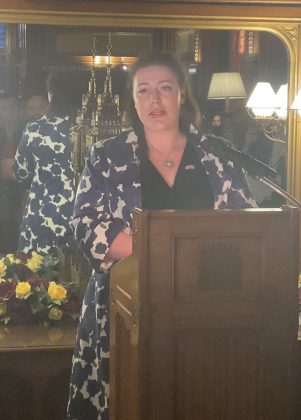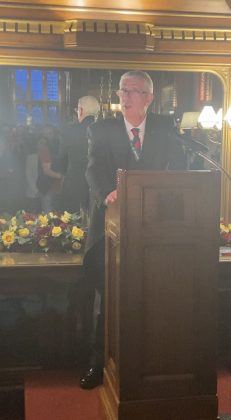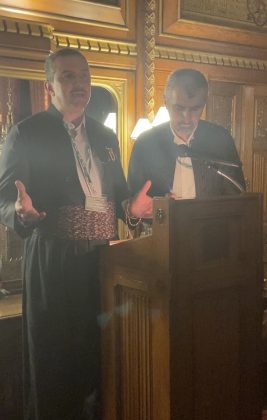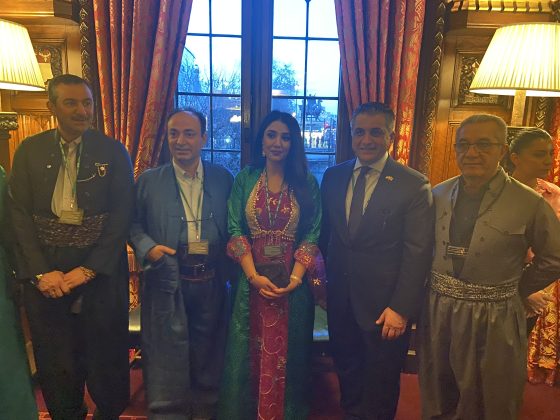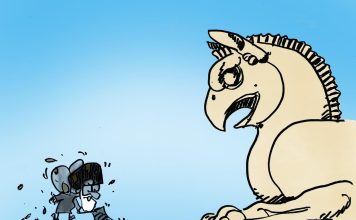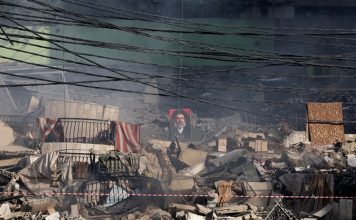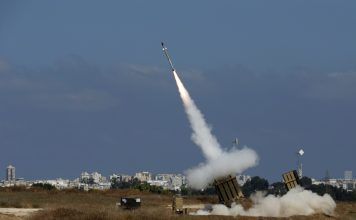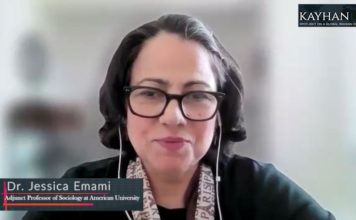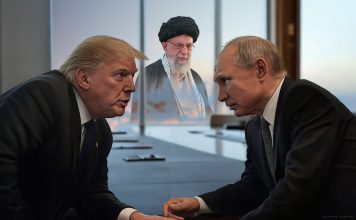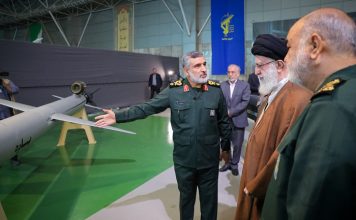The British Parliament held an event to mark the Iranian and Kurdish new year (Nowruz) on March 21, the first such celebration ever to be held by the Speaker of the House in their official residence.
The Speaker is a lawmaker chosen by members of Parliament to chair debates in the British House of Commons. The current Speaker is Sir Lindsay Hoyle.
[aesop_image img=”https://kayhanlife.com/wp-content/uploads/2023/03/N3-e1679499119984.jpg” panorama=”off” credit=”Sir Lindsay Hoyle” align=”center” lightbox=”on” captionsrc=”custom” captionposition=”left” revealfx=”off” overlay_revealfx=”off”]
The event was organized by the London-based Centre for Kurdish Progress, and involved speeches by British lawmakers, prominent Kurdish politicians and human rights defenders.
[aesop_image img=”https://kayhanlife.com/wp-content/uploads/2023/03/N6-scaled.jpg” panorama=”off” credit=”From left to right: Dr. Haval Abubaker, Osman Baydemir, Basne Farooq, Karwan Jamal Tahir and Ata Mufty. ” align=”center” lightbox=”off” captionsrc=”custom” captionposition=”left” revealfx=”off” overlay_revealfx=”off”]
“The women of Iran and particularly the Kurdish women of Iran, who have led the revolution, who have refused to be silenced when all those around them were determined to shut their voices off, give us courage every single day, as well as the women of Afghanistan and beyond,” said Alicia Kearns, a lawmaker who chairs the UK Foreign Affairs Select Committee, at the event. Kearns also chairs the All Party Parliamentary Group for the Kurdistan region in Iraq.
“What a wonderful celebration welcoming the first day of Spring,” said Hoyle, the Speaker of the House. “Historically, the Kurdish people have not had the freedoms to celebrate their identity and culture, so what a significant moment this is in Parliament, in the Speaker’s house, to acknowledge the identity, the culture, the history of the Kurdish people.”
Nowruz is celebrated by Iranians, Kurds and Syrians, and by other countries with significant Persian cultural influence such as Afghanistan, Azerbaijan, India, Kyrgyzstan, Kazakhstan, Pakistan, Turkey, Tajikistan, Turkmenistan and Uzbekistan.
Lord Bilimoria, the first Zoroastrian Parsi to sit in the UK House of Lords, said: “This is the first Nowruz function that I have ever attended in my 17 years in Parliament, so thank you for doing this, Mr. Speaker.”
[aesop_image img=”https://kayhanlife.com/wp-content/uploads/2023/03/N2-e1679499185227.jpg” panorama=”off” credit=”Lord Bilimoria ” align=”center” lightbox=”on” captionsrc=”custom” captionposition=”left” revealfx=”off” overlay_revealfx=”off”]
Hoyle noted that there were between 25 and 35 million Kurds inhabiting “the regions straddling the borders of Turkey, Iraq, Syria, Iran and Armenia, making up the fourth largest ethnic group in the Middle East.”
There are an estimated 10 million Kurds living in what is known as modern-day Iran, with the majority living in Eastern Kurdistan, a region in western Iran which borders Iraq and Turkey.
Kurds have increasingly sought independence from Iran’s government through the Kurdish separatist movement, which emerged in the late nineteenth century. The movement calls for independence and the creation of an internationally recognized state of Kurdistan.
Kurds have been routinely persecuted by Iran’s government, leading international human rights organizations to condemn the violence. Human Rights Watch accused security forces in Iran of “excessive and unlawful lethal force” in November on Kurds in the Kurdistan province’s capital, Sanandaj, amid ongoing anti-government and anti-regime protests.
At least 18 Kurdish civilians were arrested in July by officials at Iran’s Ministry of Intelligence in the cities of Baneh, Oshnavieh and Piranshahr, according to reports by the Kurdistan Human Rights Network (KHRN).
Reports from human rights watchdogs held that In 2021, ethnic minorities were disproportionately affected by death sentences imposed for unclear charges such as “enmity against God.” At least 20 Kurdish men were on death row after being convicted of similar charges.
Iran’s latest wave of nationwide anti-government protests was sparked by the death of 22 year-old Kurdish-Iranian Jina Mahsa Amini on Sept. 16, who died while in police custody. She was detained for allegedly breaching the country’s mandatory dress code for women. Amini was beaten by officials during questioning and later died of her injuries.
The anti-government demonstrations’ slogan, “Woman, Life, Freedom” — “Jin – Jiyan – Azadi” in Kurdish and “Zan – Zindagi – Azadi” in Persian — originated from a popular Kurdish slogan used by the Kurdish independence movement.
In October, following Amini’s death, Iran’s religious leaders accused the Kurdish community of inciting the uprising. Iranian security officials said Kurdish opposition groups were using Amini’s case as an excuse to reach their decades-long goal of separating Kurdistan from Iran.

